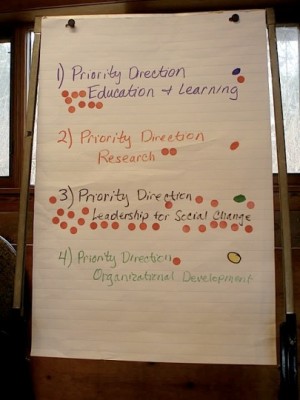Community Consultation 2009 – What We Did and What We Heard
How we got here…
In December 2008, Council approved a broad community consultation approach to gather feedback from Council members, its partners and affiliated organizations and the general public regarding CPC’s work, how we might do its work better or differently and how we might get there. The consultation process took place over 5 months in late 2009 and early 2010. We engaged participants through an online survey and focus groups. Focus groups were held with staff, volunteers and clients of WRCPC partner agencies. Participants ranged from municipal advisory committees, community and neighbourhoods groups, youth, service groups representing families and children, mental health, housing and homelessness, women’s crisis services, community justice, corrections, policing and rural communities. Over 175 people participated in 18 focus group sessions and over 500 responded to our online survey.

In February 2010, WRCPC’s Facilitating Committee, Alumni group, Community Relations Committee and CPC staff participated in a working session to work on the initial analysis of the survey and focus group data. We worked with Jo Nelson and Aziz , facilitators from ICA Associates, to identify broad themes present in the consultation information.

At the WRCPC annual retreat, Council approved the new priority directions for the 2010 – 2014 plan.
The following section makes recommendations for the Priority Directions that would form the basis of the 2010 – 2014 Future Plan.
Recommendation 1
• To revise the 2003 Strategic Direction “Public Engagement” to become Priority Direction “Education & Learning”
Rationale: this is critical to any initiative that has a prevention mandate. This direction must include a component of learning so that education is rooted in evidence based knowledge and practice. Council must always be engaged in the reciprocal learning process in order to stay current, connected to the grassroots and focused on sustainable social & community change.
Recommendation 2
• To establish a new Priority Direction for “Research”
Rationale: CPC has become recognized for developing high quality research. The Violence Prevention Plan forms a large part of the research agenda at the current time. There is a desire from the community to see additional research available through the CPC.
Recommendation 3
• To revise the 2003 Strategic Direction “Focused Problem Solving to become Priority Direction “Leadership for Social Change”
Rationale: WRCPC is being asked to provide strategic leadership for building momentum and engaging appropriate actors that together, will lead a social and community change process to enhance our collective capacity to increase protective factors and decrease risk factors associated with crime, victimization and fear of crime.
While WRCPC will continue to be involved in problem solving efforts with respect to crime prevention, many partner and affiliated organizations felt this direction from the 2003 Business Plan was too easily confused with direct service which is the work of our partners. Some of the goal statements from the original 2003 Business Plan are still relevant and may be integrated as part of this new Priority Direction.
Recommendation 4
• To establish a new Priority Direction for Organizational Development
Rationale: WRCPC is actively engaged in development activities and capacity building initiatives to ensure that we can effectively support and lead the proposed Future Plan.
Recommendation 5
• To incorporate the Strategic Direction “Partnership Building” as a core principle of the way we work rather than a Strategic Direction
Rationale: Partnership building has become Council’s standard way of working over the last eight years. While some of the goal statements from the 2003 Business Plan are still relevant and may be assumed or revised under the new Priority Directions, partnership building, per se, is no longer warranted as a direction in and of itself. Partnership and collaboration are recognized as a means of accomplishing the work of the crime prevention through social development.
What we heard, in a nutshell…
The Waterloo Region Crime Prevention Council is seen as an important and valuable community asset which is very much needed. We were encouraged to develop a healthy Future Plan that builds on the strengths of the community & WRCPC to affect social change.
WRCPC is viewed as a leader of crime prevention initiatives on many levels. The community is looking to WRCPC for this continued leadership. However, it’s easy to stretch this leadership too thin if or when we attempt to ‘be everything to everyone’. In a small community based organization, this ‘everything to everyone’ approach usually results in the following:
- a loss of a clear organizational focus,
- an emphasis on reactive response rather than proactive action,
- outcomes that may have a diluted impact.
- less effective use of resources
The community identified these issues starting to arise for the Crime Prevention Council. As a result, Council was asked to “work smarter”, “more focused” and with an emphasis on “depth over breadth” rather than simply “work harder” and “do more with less”.
We also learned a lot of important things from the community, such as:
- a Crime Prevention Council is still relevant and an important part of our community
- we must be ready to adapt to the changing needs of our community – and the community has changed!
- we heard that WRCPC is doing great work and that more people across Waterloo Region should know about this business of crime prevention through social development. Many of our initiatives are well known – Say Hi campaign, In the Mind’s Eye Film + Forum event – but the community didn’t know these were WRCPC initiatives. The community encouraged us to be bold in taking credit for the work that we do
- the community also suggested that we provide more clarity on the message of crime prevention and the role that we play
Lastly, the community consultation also affirmed the various roles that CPC undertakes in order to accomplish our work. These roles were articulated in the 2003 Business Plan and they include:
- Catalyst
- Resource
- Educator
- Connector
- Advocate
